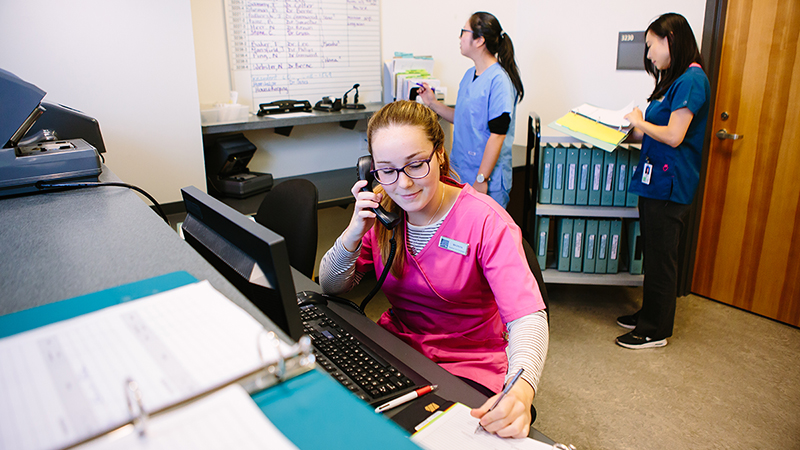Archive 2013-2019
How to choose the best health care program for you

Did you know that health care is a rapidly expanding field in British Columbia? This may not be surprising when you consider that boomers are aging, people are living longer, and we’re using more medications than ever before.
In the future, health care will only continue to grow. As medical technology advances, we’ll need new experts; as people delay retirement, they’ll access more wellness services; as we learn more about mental health, we’ll need new treatments and supports; and as the climate changes, we may even face new diseases.
WorkBC predicts 148,400 health care and social assistance job openings between 2018 and 2028 – the highest of any employment grouping – and not all jobs will be for doctors and nurses.
Explore your strengths
“There is a huge variety of health care jobs out there,” says VCC health care assistant (HCA) program leader Lisa Beveridge. The only overall requirement? “You need to value people,” she says.
For those considering the health care field, Lisa says it’s a smart move to first identify your strengths and abilities. As a nursing student, Lisa remembers one experience working on a busy surgical ward. “It was so rushed and task-focused,” she says. “I didn’t like it and it felt like a mistake!”
Lisa later found geriatrics to be a much better fit. Today, as an instructor, Lisa recommends that students start with the basics to explore their ideal position in health care. “The HCA program is a great introduction to frontline caregiving,” she says, emphasizing that in only seven months and with minimal prerequisites, you get solid foundations in safety, asepsis, and person-centered care, which are essential in many other health care jobs.
Certified HCAs who decide to enter nursing can have their experience recognized by VCC’s access to practical nursing (PN) program, which, in turn, can ladder into a Bachelor of Science in Nursing (BScN). Likewise, students who discover a talent for fine, detailed work might enter dental hygiene, or those who excel at chemistry might become pharmacy technicians.
Make connections
Another in-demand health care career is health unit coordinator (HUC). As the central contact point for all medical departments as well as patients and visitors, HUCs are exposed daily to the full range of health care careers. “It’s a big snapshot of every job in the hospital,” says VCC School of Health Sciences coordinator Katherine Griffiths.
After only six months in the HUC program, the final two months are spent working and learning in the field, with the opportunity to experience a range of environments from long-term care to trauma hospitals. “Our practicums let you explore where you’re most comfortable,” says Katherine.
HUC jobs are also out there for the taking. VCC is a main contact for hospital recruiters and, according to Katherine, most grads get hired directly out of their practicums. “These are very good jobs with very good benefits,” she says.
Follow your heart
For Lisa and Katherine, however, working in health care has incentives far beyond job security, variety, or even specialized skills. “In how many jobs can you truly improve someone’s quality of life?” asks Lisa.
“As health care assistants, we help people and families experiencing loss,” she says, explaining that they mainly work with people who have lost their health or ability to care for themselves. Often, they’ve also recently lost a home or a spouse.
According to Lisa, the feelings of reward and the “positive feedback loop” you create when you help someone who’s struggling are greater than any other service profession. “It’s unparalleled,” she says. “You’re making a lasting impact on peoples’ lives.”
________________________________________
Explore your options for entry-level health care careers at VCC:
- Dental Assisting – Certified (10 months)
- Dental Reception Coordinator (5 months)
- Health Care Assistant (7 months)
- Health Unit Coordinator (8 months)
- Medical Laboratory Assistant (6 months)
- Pharmacy Technician (7 months)
